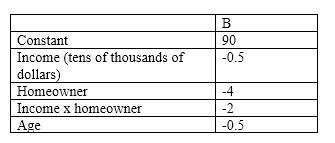A survey asked people to rate their feelings toward paying taxes on a scale of 0 to 100, with 0 being cold or unfavorable and 100 being very warm or favorable. In this model, income and age are quantitative variables, and homeowner is a dummy variable with 1 representing owning a home.

How are feelings towards paying taxes predicted to change when age increases by one year, with income and homeownership status staying constant?
What will be an ideal response?
They are predicted to decrease by 0.5.
You might also like to view...
A Nash equilibrium is the set of strategies:
a. That provide the highest payoffs for both players b. From which no player has a unilateral incentive to switch to some other strategy c. That are Pareto optimal from the perspective of both players d. That all people play in the real world
What is the difference between elite and mass political culture?
A) Elites possess better education, higher income, and more influence, and they are much more interested in politics and are more participatory. B) Elites possess equivalent education to their mass political culture counterparts, higher income, and more influence, and they are much more interested in politics and are more participatory. C) Elites possess better education, higher income, but only nominal influence, but they are much more interested in politics and are more participatory. D) Elites possess better education, higher income, and more influence, yet they are less participatory.
Discuss the "Unite the Right" protest in Charlottesville, Virginia, and the reaction of the Charlottesville police and the state of Virginia. Explain whether the government's actions were consistent with accepted limitations on the right to assemble or whether the rights of Unite the Right were violated.
What will be an ideal response?
What executive branch department was most recently created?
a. the Department of Health and Human Services b. the Department of Homeland Security c. the Department of Labor d. the Department of Education